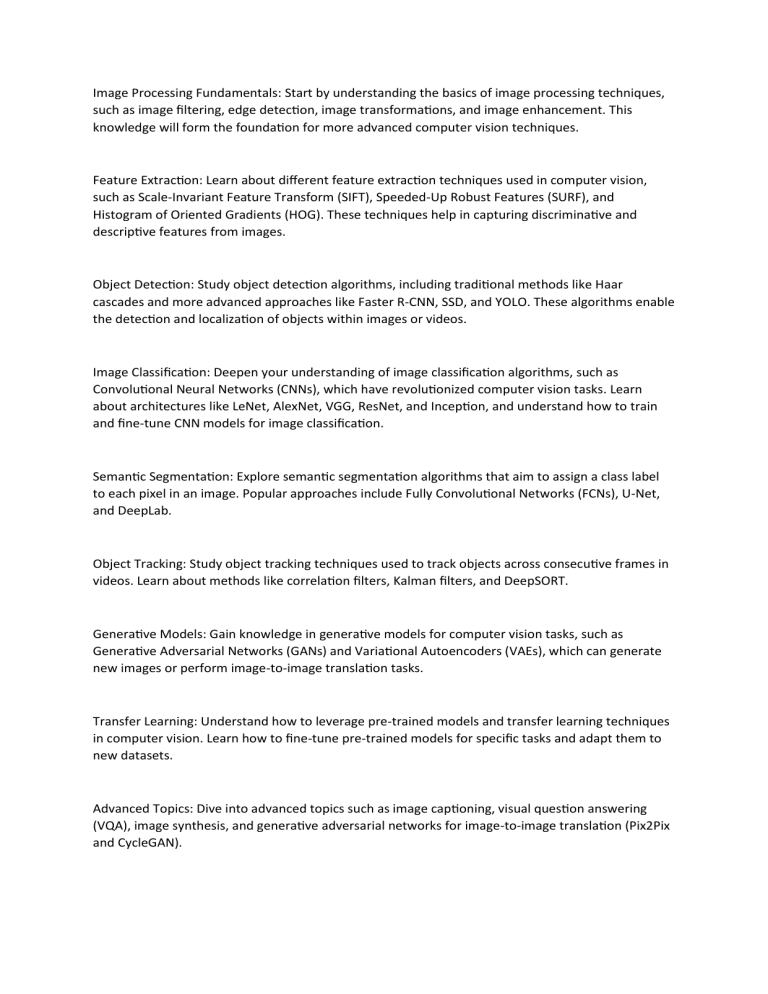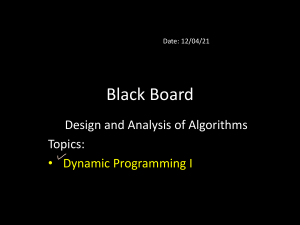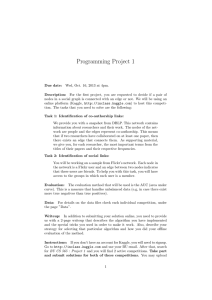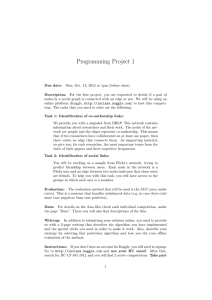
Image Processing Fundamentals: Start by understanding the basics of image processing techniques, such as image filtering, edge detection, image transformations, and image enhancement. This knowledge will form the foundation for more advanced computer vision techniques. Feature Extraction: Learn about different feature extraction techniques used in computer vision, such as Scale-Invariant Feature Transform (SIFT), Speeded-Up Robust Features (SURF), and Histogram of Oriented Gradients (HOG). These techniques help in capturing discriminative and descriptive features from images. Object Detection: Study object detection algorithms, including traditional methods like Haar cascades and more advanced approaches like Faster R-CNN, SSD, and YOLO. These algorithms enable the detection and localization of objects within images or videos. Image Classification: Deepen your understanding of image classification algorithms, such as Convolutional Neural Networks (CNNs), which have revolutionized computer vision tasks. Learn about architectures like LeNet, AlexNet, VGG, ResNet, and Inception, and understand how to train and fine-tune CNN models for image classification. Semantic Segmentation: Explore semantic segmentation algorithms that aim to assign a class label to each pixel in an image. Popular approaches include Fully Convolutional Networks (FCNs), U-Net, and DeepLab. Object Tracking: Study object tracking techniques used to track objects across consecutive frames in videos. Learn about methods like correlation filters, Kalman filters, and DeepSORT. Generative Models: Gain knowledge in generative models for computer vision tasks, such as Generative Adversarial Networks (GANs) and Variational Autoencoders (VAEs), which can generate new images or perform image-to-image translation tasks. Transfer Learning: Understand how to leverage pre-trained models and transfer learning techniques in computer vision. Learn how to fine-tune pre-trained models for specific tasks and adapt them to new datasets. Advanced Topics: Dive into advanced topics such as image captioning, visual question answering (VQA), image synthesis, and generative adversarial networks for image-to-image translation (Pix2Pix and CycleGAN). Practice and Projects: Reinforce your learning by working on computer vision projects and participating in competitions like Kaggle. Implement the algorithms you have learned and apply them to real-world problems. #-----------------------------------------------------------------------------------------------------------------------------------Online Courses: Coursera: "Convolutional Neural Networks" by deeplearning.ai, "Deep Learning Specialization" by deeplearning.ai, "Introduction to Computer Vision" by Georgia Institute of Technology. Udacity: "Intro to Computer Vision" by Udacity, "Deep Learning" by Udacity. edX: "Deep Learning Fundamentals" by IBM, "Deep Learning for Computer Vision" by National Research University Higher School of Economics. Books: "Computer Vision: Algorithms and Applications" by Richard Szeliski. "Deep Learning" by Ian Goodfellow, Yoshua Bengio, and Aaron Courville. "Convolutional Neural Networks for Visual Recognition" by Fei-Fei Li, Justin Johnson, and Serena Yeung (free online book). Online Platforms and Tutorials: PyImageSearch (https://www.pyimagesearch.com/): Provides a wealth of tutorials and resources on various computer vision topics using Python and popular libraries like OpenCV and TensorFlow. Adrian Rosebrock's blog (https://www.pyimagesearch.com/author/adrian/): Contains tutorials, guides, and practical examples related to computer vision and deep learning. Research Papers and Publications: ArXiv (https://arxiv.org/): A repository of research papers in various domains, including computer vision. You can find the latest research papers and state-of-the-art techniques in computer vision. Conference proceedings: Check out proceedings from conferences like CVPR (Conference on Computer Vision and Pattern Recognition), ICCV (International Conference on Computer Vision), and ECCV (European Conference on Computer Vision) for the latest research in computer vision. OpenCV Documentation and Tutorials: OpenCV (https://docs.opencv.org/): The official documentation of OpenCV provides tutorials, guides, and examples for computer vision tasks using the OpenCV library. Kaggle Kernels and Competitions: Kaggle (https://www.kaggle.com/): Participate in computer vision competitions and explore Kaggle Kernels, where you can find code examples, tutorials, and notebooks related to various computer vision tasks.


